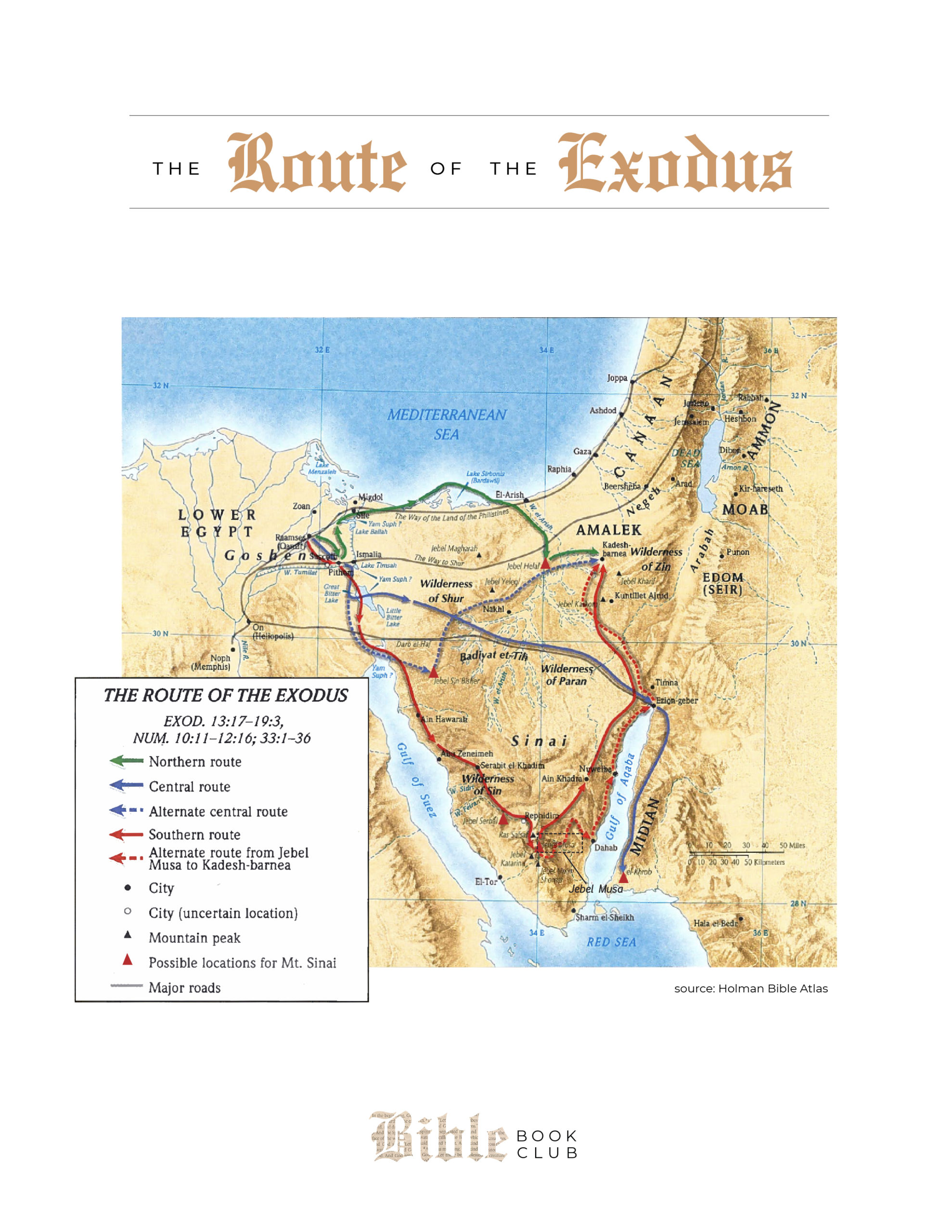In Exodus 17-18, we see the Israelites get attacked by the Midianites. Moses battles fatigue and God shows the Israelites that they need to work with Moses instead of against him. In chapter 17, we get test #3.
The water at Marah and the Manna and Quail are the first 2 tests from God to teach the Israelites to trust him. The other two are in chapter 17, which begins with yet another water crisis. Why?
W A T E R
- The Nile river is the most important topographical feature of Egypt
- The water it provides is the only source of water in an otherwise barren land
- It is not surprising then that water is a reoccurring topic in Exodus.
- Baby Moses is saved by being placed in water
- And it is a reminder every time the Israelites say his very name.
- Moses means “drawn out of the water”
- They are wandering through the dry desert calling out “drawn out of water”
- The first plague turns water into blood
- The Israelites cross through water, and the Egyptians die in that same water.
- Baby Moses is saved by being placed in water
-
Now as a new nation, Israel has left the Nile as their source of water and feels the loss.
- The lack of water is a constant reminder of how tenuous their life is.
- They have left their water source behind to follow God
- God is going to use this source of life, water, to build their trust in him.
- Ultimately we know in the new testament, Jesus uses this human need for water as an analogy to help us understand the life-giving source that He himself is to us.
Test #3: Water again
The Israelites take grumbling to a new level by testing the Lord and threatening Moses.
- Rephidim is in the middle of the southern end of the peninsula. We are getting very close to Mount Sinai.
- Surely this new complaint seems to be more than just a lack of faith.
- The people are getting cranky, and this is a demand. Moses is the target for their expectations.
- The Israelites are very bold, demonstrating a lack of fear and respect for God.
- They even go so far as to ask “is the Lord among us or not?”
- But still, God patiently supplies their needs.
- Rephidim gets a new name, Massah which means testing, and Meribah which means quarreling.
Moses by this point must be exhausted. He has had daily conflicts of gigantic proportions, first with Pharaoh and the Egyptians, then with his own people.
And now he faces yet another battle.
Test #4: The Amalekites, the first nation to attack the Israelites
Amalek
- Was the son of Eliphaz, who was Esau’s eldest son.
- Remember Esau was Jacob’s twin brother. And they did not get along.
- So the Amalekites are cousins to the Israelites.
- They are the first of the nations to attack Israel
Joshua
- This is his first mention in the Bible and his first battle.
- Joshua is thought to be about 45 years old
- Joshua is from the tribe of Ephraim who was Joseph’s son.
- He will be Moses’ personal assistant for years in the desert
- And Joshua and Caleb are the only 2 men from Egypt over the age of 20 who live to enter the promised land.
E X T E R N A L C O N F L I C T A N D B A T T L E F A T I G U E
The Israelites have barely recovered from the terror of Egypt pursuing them and already another external threat comes out of nowhere. However, the focus of the conflict in this story is not Joshua and his men, it is Moses.
- Joshua is fighting as he was ordered, but the battle is not being won on the field.
- The battle is really won on the hill where Moses is fighting to keep his hands up.
- As Moses tires and his hands fall, all of Israel can see that Joshua and his men falter.
- God is sending Israel a message.
- The nations will attack and they must fight.
- However, the victory will not come from their efforts.
- But from God, through Moses.
- They will suffer if they do not learn to work with Moses rather than against him
- Remember in their last bout of thirst they threatened to stone Moses if he didn’t do something about the water situation.
- The Israelites must understand that while God is going to sovereignly provide for his people He has expectations of them.
- They must trust God and come alongside Moses when his tasks become too heavy.
Why such wrath at Amalek?
- Amalek is trying to get in the way of God’s plan of redemption by putting an end to Israel.
- Israel is not just any nation, they are the chosen nation that will give birth to Jesus.
- Israel’s redemption from Egypt was only one phase of God’s plan.
- To get to the next phase the nation must survive.
- Therefore, God’s wrath will fall on any nation that tries to destroy Israel.
- Those nations are in opposition to God.
- Once Jesus is born another phase begins, Christ comes so that all nations can be redeemed
- Jesus grafts all nations into Israel
- We can participate in that redemption
- The opposition moves then from against nations to us as individuals.
- However, in the final phase told in Revelations, there will be an end to all opposition to God, forever.
We too have spiritual enemies. God has a plan for you just as he did for Israel. And like Moses sometimes we become fatigued battling all that comes against us. Do you have an Aaron or Hur in your life; someone to hold you up when you are exhausted? What is your greatest spiritual battle right now?
J E T H R O P R A I S E S G O D
- Jethro was a Midianite, the descendants of Abraham through his second wife Keturah.
- He was a priest but may have had limited knowledge of God.
- But unlike the Egyptians and the Amalekites, Jethro gets it.
- Jethro sees the hand of God and knows that He is greater.
What became of the Midianites?
- the Midianites, however, are not always friends with the Israelites. They will battle Israel in Judges and Isaiah will speak harshly of them.
I N T E R N A L C O N F L I C T A N D B A T T L E F A T I G U E
- Here we have a glimpse of the not-so-perfect Moses.
- Of course, Moses could not resolve disputes for 2 million people.
- Why did he not think of this on his own?
- Perhaps water to drink and military battles took precedence over organizing a legal system.
- Moses was living in the important, urgent quadrant of life.
Are you battling fatigue? Life keeps us very busy, and some of us take on too much. Are you living in the important, urgent quadrant? Does your load feel too heavy for you? Do you have a friend that knows you well enough to see when you are out of balance?
The law before the nations had laws and the law now.
- Jethro’s advice is clear: the answer to every dispute must come from God.
- God’s precepts should be the basis for the law of the land. (before nations had laws)
- Therefore, Moses must teach the people God’s decrees.
VERSES MENTIONED:
SHOW NOTES:
The Route of the Exodus
THE SCORECARD
| ISRAEL REJECTS (Moses + God) | ISRAEL TRUSTS (Moses + God) |
| The next day he went out and saw two Hebrews fighting. He asked the one in the wrong, “Why are you hitting your fellow Hebrew?” The man said, “Who made you ruler and judge over us? Are you thinking of killing me as you killed the Egyptian?” Then Moses was afraid and thought, “What I did must have become known.” 2: 13-14 | Moses and Aaron brought together all the elders of the Israelites and Aaron told them everything the Lord had said to Moses. He also performed the signs before the people, and they believed. And when they heard that the Lord was concerned about them and had seen their misery, they bowed down and worshiped. 4:29-31 |
| When they left Pharaoh, they found Moses and Aaron waiting to meet them, and they said, “May the Lord look on you and judge you! You have made us obnoxious to Pharaoh and his officials and have put a sword in their hand to kill us.” 5: 20-21 | All the Israelites did just what the Lord had commanded Moses and Aaron. And on that very day, the Lord brought the Israelites out of Egypt by their divisions. 12:50-51 |
| They said to Moses, “Was it because there were no graves in Egypt that you brought us to the desert to die? What have you done to us by bringing us out of Egypt? Didn’t we say to you in Egypt, ‘Leave us alone; let us serve the Egyptians? It would have been better for us to serve the Egyptians than to die in the desert!” 14″11-12 | And when the Israelites saw the mighty hand of the Lord displayed against the Egyptians, the people feared the Lord and put their trust in him and in Moses his servant. 14:31 |
| For three days they traveled in the desert without finding water. When they came to Marah, they could not drink its water because it was bitter. (That is why the place is called Marah.) So the people grumbled against Moses, saying, “What are we to drink?” 15:22-24 | |
| In the desert, the whole community grumbled against Moses and Aaron. The Israelites said to them, “If only we had died b the Lord’s hand in Egypt! There we sat around pots of meat and ate all the food we wanted, but you brought us out into this desert to starve this entire assembly to death.” 16:2-3 | |
| They camped at Rephidim, but there was no water for the people to drink. So they quarreled with Moses and said, “Give us water to drink.” Moses replied, “Why do you quarrel with me? Why do you put the Lord to the test?” 17:1-2 |



